#'turning and turning in the widening gyre/things fall apart the center cannot hold' as they say
Text
Speaking of stupid reasons to criticize the Autobots (or rather, the opposite), I actually find the ““““problematic”““““ nature of Cop IDW Optimus and other elements of the plot to be quite essential to enjoying the story and seeing it as a balanced, nuanced story.
Because like... in other continuities, the story of revolution seems to be very much “there were good revolutionaries and there were bad ones, and then the bad ones wanted to be in charge and then they fought about it for 4 million years.” Which seems very weak to me not just in the “revolution bad” sense, but it makes me wonder how the war could go on for millions of years when the Autobots and Decepticons literally had the same goal and achieved it, now they’re just fighting over who gets to be in charge.
But like, in IDW1, the Autobot insignia and stuff already existed as a badge for the previous regime of the Prime/Senate. Orion Pax (now Optimus Prime) was a lackey of Zeta Prime who was either his loyal puppet at best or being groomed for the position of Prime at worst. Most of the people Optimus Prime recruited to help him fight were other police officers and military members he was affiliated with, who were already cracking down on the Decepticon movement as it became more and more violent.
With that base of Optimus/the Autobots being actually ~problematic~, I can absolutely see why the Decepticons wouldn’t consider the war over and would continue fighting. I mean, why the hell would they trust a police enforcer/military officer who was lackeys with the PRIME? Why would they think Optimus actually believes in peace and equality?
Of course, the Decepticons have their own problems as well. What was once a universal political movement (because remember, the Decepticon movement began with Megatron’s writings but he was NOT the leader of a militarized faction until Megatron Origins) was taken over by essentially an underground criminal gladiator organization that began engaging in weapon trafficking, crime, and terrorism. From the Autobot perspective, the Decepticons are allies for equality gone bad due to Megatron’s violent influences and the gladiator/criminal aspects overtaking the actual social equality vibes.
I just think that the premise of IDW1′s Autobot-Decepticon war is so good because like, the Autobots and Decepticons existed in a way BEFORE either Megatron or Optimus became the official leaders of those two specific, organized, militarized factions. But the society that created them and the two different social classes they came from doomed them to distrust each other. It wasn’t ever a fight about who got to be in charge, it was a war between two different factions of people who had every reason to distrust each other and think that the other faction would subjugate them if they allowed them to gain power.
#squiggposting#meta#anyways that's another reason why the aversion to cop optimus kind of bores/annoys me#like yeah he's a cop for an evil regime and you know what?#that adds momentum and stakes to the narrative that clearly explains why he would be distrusted (or trusted) by so many#every time i see clear idw1 fics give OP a different background it just kind of loses my interest immediately because it's like#oh okay this is just good revolutionaries and bad revolutionaries and a friendship gone bad#anyways this post isn't about OP or MOP alone#what i treasure in canon is like... the fact that it's so REAL#unfortunately canon doesn't really give it nuance the way i'm making it out to be#but like in my imagination i can SEE the mutually earned distrust#i can SEE how the war isn't just a fight for power or resources but a fundamental fear of each other based on historic wrongdoings#and if you look at it from a pure autobot or pure decepticon perspective#you can see both sides of why they would hate/distrust each other#'turning and turning in the widening gyre/things fall apart the center cannot hold' as they say#like MMMMMMMMM it's history it's social issues it's politics#it's about a small selection of highly charismatic figures and their allies/mentors who form the perfect storm of hatred and chaos
13 notes
·
View notes
Text
I'm interested in Javert's list of demands (read: gentle suggestions). He is wracked by a crisis. The tenets of his life no longer mean anything. His life's work amounts to less than nothing-- it may have been carried out in error. Turning and turning in the widening gyre, the falcon cannot hear the falconer, things fall apart; the center cannot hold-- you get the idea.
But he still feels compelled the leave the scene of his final act to fire off "A Few Observations for the Good of the Service", which makes sense in light of his revelation, except compared to the internal monologue chronicling collapse of his faith and all the ideals he held sacred, the observations are pretty tame. Some of this is probably "man who has not expressed a single profound thought in his entire life isn't about to start right at the end", but if we grade the observations on a curve, given what we know about Javert's ideas of obedience and speaking up (PUNISH ME MR. MAYOR), it maybe reveals something about how that ideological rigidity was daily maintained.
To be sure, some of his observations are (or can be construed as) anti-prisoner: ensuring a woman working at the canteen can't reach out and touch their hands, a recommendation for more isolation and misery perhaps. Some are pointers on police efficiency, or scolding subordinates for lack of discipline. Some, though:
“Fourthly: it is inexplicable why the special regulation of the prison of the Madelonettes interdicts the prisoner from having a chair, even by paying for it.
Most of the points that would suggest some kind of reform for the prisoner's benefit are couched in terms of pure efficiency or rule-of-law (conditions that allow for illness to spread among prisoners costs the state money, letting some prisoners extort money from others is just more crime) but point number four seems almost purely altruistic. We have to imagine at one point Javert had the thought "well, why can't Prisoner 42069 have a chair?" and then immediately, ruthlessly squashed it down. Because those are the rules, that's why. And he put that thought away and didn't let it out until everything else that gave order and structure to the world collapsed from under him.
As statements go its meticulously worded (and perfectly grammatical, we are assured) but still slightly incoherent- the points are all over the place, not in any kind of order and with minimal rational, which I suppose speaks to his state of mind. I think you can read it as the actions of a short-circuiting machine, spitting out the last few processes as Daisy Bell winds down-- or perhaps just as a catalogue of doubts. Whoever opens it up probably won't get much out of it-- a quick "alright, duly noted" before tossing the not-quite-manifesto in the trash-- but I'm curious what we, the readers, are meant to take away from it. Tidying up loose ends? I don't think 'defiance' is quite right, but maybe something closer to a petition. What someone who has never in his life believed much in democracy might come up with when seized with the need to express dissatisfaction.
I don't know, I'm still chewing on it.
13 notes
·
View notes
Text
Can the Center Hold?
As we move forward through these strange times, I find myself careening these days back and forth between my native pessimism about the world and the occasional flash of uncharacteristic optimism. On the whole, things are probably no worse than they have been in the course of these last few months. And in some ways, things are actually looking up. (For one thing, I keep hearing rumors about some sort of imminent deal that will bring at least some of the hostages home. So that sounds hopeful.) I know both those things. But another part of me feels that the gyre is widening and that, at least in the end, the center will not hold. I write this week not to scare or depress, but to share my ill ease and to find comfort in inviting you to join me in hoping together for better times to come.
Yeats (that is, William Butler Yeats, 1865—1939) was one of the world’s greatest English-language poets, a Nobel laureate, eventually a senator in the Irish government. He was a strong Irish nationalist and he definitely flirted—and probably even more than just flirted— with the rising fascist movements of the 1930s. Not an anti-Semite in same sense as Ezra Pound or T. S. Eliot, he was nonetheless part of a world that held anti-Judaism and anti-Semitism to be part of a normal, educated person’s worldview. (For a brief but trenchant review of Irish anti-Semitism over the ages that appeared in the Irish Times a few years ago and that specifically mentions Yeats, click here.) There’s a lot of evidence to review, but I don’t wish to sort it all out here. Nor do I want to comment—not now, at any rate—about the set of bizarre reasons that have led Ireland to be the most consistently anti-Israel nation in Europe. (For a recent essay published in the U.K.’s Jewish Chronicle on that precise topic, click here.) Instead, I’d like to use one of Yeats’ most famous poems, “The Second Coming,” to frame my thoughts about the world we are all living in.
Yeats begins his poem with a stunning image:
Turning and turning in the widening gyre
The falcon cannot hear the falconer;
Things fall apart; the centre cannot hold;
Mere anarchy is loosed upon the world,
The blood-dimmed tide is loosed, and everywhere
The ceremony of innocence is drowned;
The best lack all conviction, while the worst
Are full of passionate intensity.
A gyre is a gigantic circular oceanic surface current. Before the poet starts to write, he looks out at the sea and finds it calm, placid, and peaceful. And then the churning begins. At first, it is barely perceptible, hardly even noticeable. And then, slowly, the motion picks up speed. What was tranquil and serene just a moment earlier is suddenly unsteady and unfixed in place. And as the speed of the water picks up, the pleasurable expectation of swimming peacefully in calm waters is replaced by the fear of drowning in those same waters. Nothing, suddenly, is as it should be. The tightest personal connections—Yeats uses the intimate relationship of the falcon and the falconer—become attenuated, then ruined entirely by the deafening gyre as it picks up speed and grows louder and stronger. In the world the poet is comparing to the sea, then, things that are normally each other’s natural complement—butter and toast, coffee and cream, pillow and pillowcase, socks and feet—these normal connections too weaken. And, in the end, the center itself around which life revolves—the family, the house, the workplace, the church, the shul, the park, the grocery—the center doesn’t hold and what was once normal, even pedestrian, now seems unpredictable and in a state of permanent, debilitating flux. And then, just like that, nothing at all seems fixed in place. Or safe.
I’ve lost track of the news even though I read obsessively. I subscribe to a dozen daily news bulletins, peruse half a dozen on-line newspapers, have an inbox that is constantly overflowing. My junk file has its own junk file. I am, I think, as up-to-date on the world’s goings-on as anyone who has a day job could possibly be. Mostly, I deal with it all by compartmentalizing the data, thus storing it in manageable chunks for later degustation (which I occasionally even get to). In that way, my center can hold. But just lately the center is not holding. And the gyre feels more than ever as though it is ominously large and ever-widening.
Let’s consider one single week’s worth of news. A man was arrested last Monday in London and charged with having attacked several employees in a kosher supermarket with a knife. In Haifa, a terrorist drove his car into a crowd of civilians just yards from the front entrance to the Haifa Naval Base. A Chabad rabbi in Washington was pushed out of a Lyft cab by the driver, who then violently attacked him. A terror cell about to perpetrate an “October 7-like attack” was identified and neutralized in Jenin. A would-be terrorist was shot and killed as he tried to murder soldiers standing guard at the entrance to Tekoa, a peaceful town in the Gush Etzion bloc that Joan and I visited just last summer. The International Court of Justice considered seriously a charge of attempted genocide made by South Africa against Israel, then rendered its decision almost without reference at all to the October 7 pogrom that took the lives of well over twelve hundred innocent Israeli civilians, some of whom were beheaded and others of whom were raped. The speaker of the French National Assembly commented the other day that the steep resurgence of violent anti-Semitism in France had reached the level at which it poses “a threat to the foundations of [the French] republic.” Federal agents in Massachusetts arrested a man who was making credible threats of mass violence against Jews and Jewish institutions in his state. Undeniable proof was adduced that UNRWA, the branch of the United Nations charged with supplying humanitarian aid to the Palestinians, is so suffused with actual Hamas-affiliated terrorists and sympathizers that it wouldn’t be that unreasonable for UNRWA itself to be considered a terrorist organization. (If you have access to the on-line version of the Wall St. Journal, click here for a truly shocking account of the whole UNRWA scandal.) The top civil rights officer at the U.S. Department of Education, who has spent her entire professional life as a civil rights attorney, declared herself “astounded” at the level of anti-Semitic aggression the characterizes our nation’s college campuses. To offer one single example, students at Stanford University, once a school I would have characterized as one of our nation’s finest, were chased just last week from a campus forum on anti-Semitism by a crowd of haters threatening to hunt them down in their homes and, at least by implication, to murder them there. (Click here for the horrific details. They’d have to pay me to send a kid of mine to Stanford. But I wouldn’t anyway.)
Is the center holding? More or less. So far.
The poet continues with reference to anarchy being “loosed upon the world” and goes on to imagine innocence itself drowning as the “blood-dimmed” tide rises. And the problem is not only the brutal barbarism of the aggressor; it’s also the fecklessness of the aggressed-against: “The best lack all conviction, while the worst / are full of passionate intensity.” Oy. And so ends the first half of the poet’s poem.
Being a Christian, Yeats imagines the salvation of the world in Christian terms. No problem with that for me: in what language should the man speak if not his own? And so the Christian man looks to the horizon for salvation and expects Jesus. But Jesus does not appear at all. The poet is ready for the Second Coming, for the messianic moment, for redemption. But on the horizon he suddenly espies something else entirely:
…somewhere in sands of the desert
A shape with lion body and the head of a man,
A gaze blank and pitiless as the sun,
Is moving its slow thighs, while all about it
Reel shadows of the indignant desert birds.
The darkness drops again; but now I know
That twenty centuries of stony sleep
Were vexed to nightmare…
The savior cometh not and instead cometh the “rough beast, its hour come round at last.” The poet expects to be saved, but his hopes are dashed as his faith turns out to have been misplaced entirely because all the distant horizon can deliver up is a monster. All the promises of modern society—prosperity, human dignity, security—turn out to be hollow, misshapen fantasies; none will help much. Or at all. The much-awaited Second Coming yields only an ogre, a fiend, a “rough beast.” There is no hope.
And where does that leave us? I too look to the horizon and wait for redemption. I also fear the “rough beasts” of anti-Semitism, anti-Israelism, anti-humanism, and anti-Americanism, the four horsemen (to wander back into Christian terms) of my personal most-feared apocalypse. And yet, despite it all, I don’t find myself entirely drained of hope. I keep perusing the headlines with all the doom they presage for the world and all the terribleness they recount, but somehow find myself able to retain hope in the future. Where that comes from, I have no idea. Maybe it has to do with relativity. Hamas is Amalek, but we’ve faced worse. Our American college campuses are minefields for Jewish students, but things will surely improve as the problem is dragged out into the light and the world can see the haters for what they are and respond accordingly. Israel’s set of tasks in Gaza is beyond daunting, but the tide seems slowly to be turning. I continue to harbor the real hope that the hostages are all still alive and that the rumors of a deal to release them will turn into reality. And even though the streets of our cities seem clogged with villains whose hatred for Israel feels visceral rather than rational, I still have confidence that the American people will never embrace anti-Judaism and that the republic, the indivisible one featuring liberty and justice for all, will never turn on its own citizens. Do I sound Pollyanna-ish or rationally hopeful? Like an ostrich with its head in the sand or a Jew with his head held high? Even I am not sure. But I continue to believe in the future, in our future in this place and in the future of Israel. “You may say I’m a dreamer, but I’m not the only one.”

2 notes
·
View notes
Video
youtube
Turning and turning in a widening gyre
The falcon cannot hear the falconer;
Things fall apart; the center cannot hold;
Mere anarchy is loosed upon the world,
The blood-dimmed tide is loosed, and everywhere
The ceremony of innocence is drowned;
The best lack all conviction, while the worst
Are full of passionate intensity.
Surely some revelation is at hand;
Surely the Second Coming is at hand.
The Second Coming! Hardly are those words out
When a vast image out of Spiritus Mundi
Troubles my sight: somewhere in the sands of the desert
A shape with lion body and the head of a man,
A gaze blank and pitiless as the sun,
Is moving its slow thighs, while all about it
Reel shadows of the indignant desert birds.
The darkness drops again; but now I know
That twenty centuries of stony sleep
Were vexed to nightmare by a rocking cradle,
And what rough beast, its hour come round at last,
Slouches toward Bethlehem to be born?
— William Butler Yeats
7 notes
·
View notes
Text

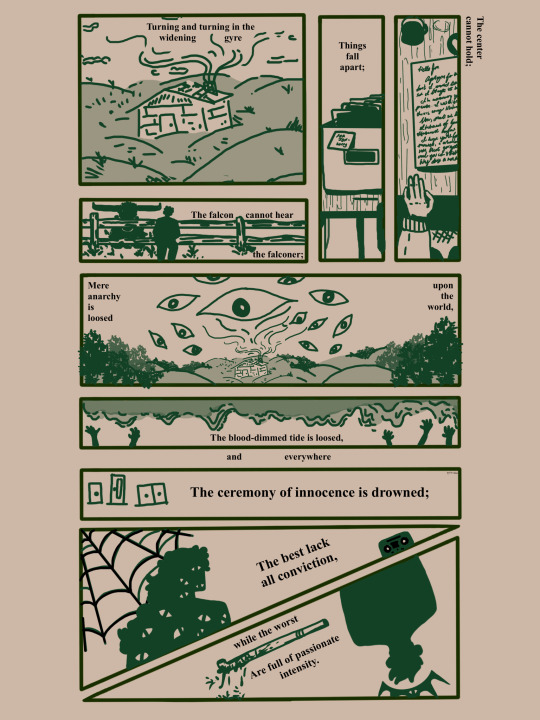
Stylistic & Reader Friendly | The Second Coming; William Butler Yeats | I still don’t think I’m over that finale.
[ ID: Two comic panels side by side. One is darker tinted and drawn on a sketchbook page, the other on a clean, bright background. The darker panel, on the left, is handwritten. The clean background is in typeface. Both depict the same images and words, but punctuation differs slightly. There are nine comic cells, drawn in shades of dark green and black in a line art style with minimal shading. All of the text is black. The first panel, a medium sized square, depicts a simple cottage set in low hills under a cloudy style. The first line, above the smoke coming out of a chimney, reads “Turning and turning in the widening gyre”. The second panel is a horizontal rectangle under the first panel, and depicts the filled in outline of a man sitting on the bottom of two lines on a row of fencing. To his left, behind the fence, a bull kneels. Grass is growing around them. The line says “The falcon cannot hear the falconer” The third and fourth panel are identical vertical rectangles to the right of the first two. The third shows a box full of papers and folders. Affixed to the box is a sticky note that reads “For Jon- sorry”. The box rests on a wooden table alongside a pen. The text above reads “Things fall apart;” and the fourth panel shows a wooden desk with a paper, a coffee mug, a coaster, and a hand on it. The paper seems to depict some of Jonah’s monologue from MAG 160. It is partially out of frame. The hand on the edge of the desk is slightly covered by a sweater sleeve and is attached to someone out of frame in a chair. To the right, outside of the panel, reads “The center cannot hold”. The fifth panel is a large rectangle under the first four panels. It shows the same cabin from before, but from a distance. More hills and forest is visible behind and to both sides. More smoke curls up and out of the chimney into a sky full of eyes. To the left- “Mere anarchy is loosed” and to the right “upon the world,”. The sixth and seventh panels are smaller rectangles under the fifth, distanced slightly from each other. The sixth is a shoreline, on the top water is coming in that is shaded slightly, and on the bottom hands seem to reach up to it. Text in the middle reads “The blood-dimmed tide is loosed” and under the panel the words “And everywhere” spaced to match the words above it. The seventh panel shows three small doors on the left, one with one knob in the middle, one with a window in the middle and a knob to the left, and a set of double doors with knobs in the middle of each. They are not attached to anything but their own piece of floor. The words to the right of the doors read “The ceremony of innocence is drowned”. The final two panels are triangles lined up with the rest of the panels, mirroring each other so one faces up and the other faces down. It looks like a square has been severed diagonally from right to left. In the top triangle to the left, the filled in silhouette of a long curly haired man covered in eyes is visible in front of a black and green spiderweb. A green tape recorder is in the top right corner, with the tape and features black. The words say “The best lack all conviction”. The bottom triangle to the right shows another filled in silhouette of a man with short hair and a sharp crown with five points curving around his head. He is upside-down, parallel to the other man. There is a singular eye in the center of the crown. To his left is a pipe covered in blood. Above the pipe reads “While the worst” and underneath reads “Are full of passionate intensity” End ID. ]
#the magnus archives#tma fanart#tma comic#mag 160#tma spoilers#the second coming#click for better quality#and choose whichever version works better for you#jonathan sims#martin blackwood#elias bouchard#the eye opens#sometimes you have to not pay atttention to the class you’re in and do something completely unrelated#image description
83 notes
·
View notes
Text
The Spiral, the Storm and the Wheel
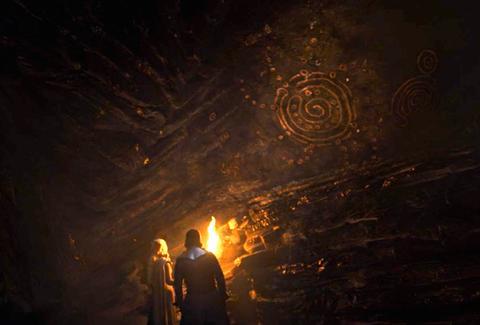
THE SPIRAL
The White Walkers are in many respects a mysterious and somewhat frustrating enemy in Game of Thrones. They never speak but they do have some form of intellect since they create grisly patterns out of severed body parts: 1) a bisected circle and 2) a spiral. Both symbols originated with the creators of the WW, the Children of the Forest - and the spiral in particular is associated with the creation of the Night King since the tree where he was created was surrounded by a spiral created out of standing stones.

It is still unclear what the spiral signified for the Children of the Forest - but in an interview in The New York Post, Dave Hill, one of the writers on the show, explains that the Night King has adopted the symbol as a way to mock his creators:

The question is: has the meaning changed through this appropriation? That is at present not possible to answer since we have no idea what the symbol originally meant to the Children of the Forest. However, I do think that we can attempt to figure out what the Night King means when his people re-create the spiral through dismembered human and animal bodies. Because these spirals are a message, in a sense, and he’s saying “I am coming for you” while at the same time making a mockery of something that was sacred to his creators.
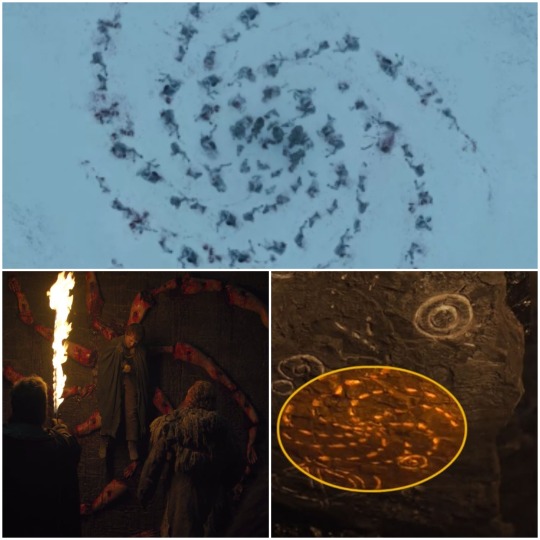
This spiral looks a lot like a wheel without a rim, endlessly spinning around and around. This is rather interesting since Daenerys Targaryen repeatedly talks about “breaking the wheel” in relation to her political ambition of conquering Westeros (I’ll return to this subject later). If the spiral is a spinning wheel, then what does it mean? The image of poor little Ned Umber at the center of a spiral made of severed human limbs in the first episode of season 8 inspired Professor Tyler Dean to write a very interesting opinion piece on the website of the publishing house Tor, which specializes in science fiction and fantasy:
The Mexica believed that time was a spiral. Not a circle, where everything that happened previously was destined to happen again, identical, ad inifinitum. Not linear, where the way forward was uncharted and momentum, progress, and change ruled the day. But, as author/illustrator James Gurney once pointed out to my eight-year-old brain, a combination of the two: a spiral. The forces of history push us ever forwards, but events rhyme with one another—parallel but not identical. That was what I couldn’t get out of my head after watching “Winterfell,” the final season premiere of Game of Thrones.
...
Spiral time is uncanny. We are reminded of familiar events and sequences but they are spiked with the creeping dread that they are not quite what we think or expect them to be.
...
We might be tempted to think of spirals as orderly and predictable, but “Winterfell” reinforces the idea that time in Westeros is not organized in a tightly-bound pattern but a widening gyre: each revolution around the center may echo previous events, but it brings its own entropy and decay. (Tor.com)
This idea of time as a spiral is a very interesting one but what I find especially compelling is this notion of the spiral being connected to an idea of entropy and decay. Tyler goes on to quote The Second Coming, a famous poem by W.B. Yeats:
Things fall apart; the centre cannot hold;
Mere anarchy is loosed upon the world,
The blood-dimmed tide is loosed, and everywhere
The ceremony of innocence is drowned
THE STORM
The notion of decay in relation to the spiral set off various chains of association for me - about how the Night King and the White Walkers are an inhuman and unrelenting force of destruction, in that sense that they come close to be the magical equivalent to a destructive force of nature. The NK is even described as such by Jon Snow who says that he is the Storm. That made me connect the spiral with images of storm systems as they look from space.
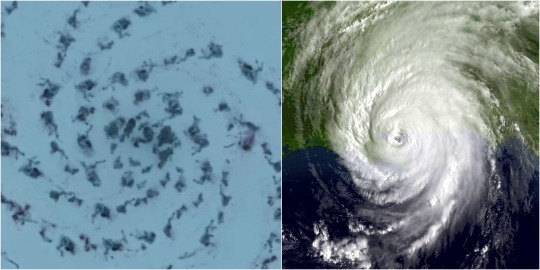
On the right we have a picture of a spiral that the WW made from dismembered horses after they defeated the Night’s Watch at The Fist of the First Men in season 2. The picture to the left is a satellite image of a hurricane. The visual resemblance is very close indeed.
In the first episode of season 8, the spiral was reintroduced when Tormund, Beric and the remainder of the Night’s Watch come upon what remains of the Umber seat, The Last Hearth, after it has been run over by the WW.

When it turns out that poor little Ned Umber has become a zombie, Tormund and friends set fire to him and the body parts that make up the spiral. This is the first time that we’ve seen the spiral associated with the element of fire. This has led people to note a certain resemblance between the spiral and the style in which the Targaryen sigil is rendered.
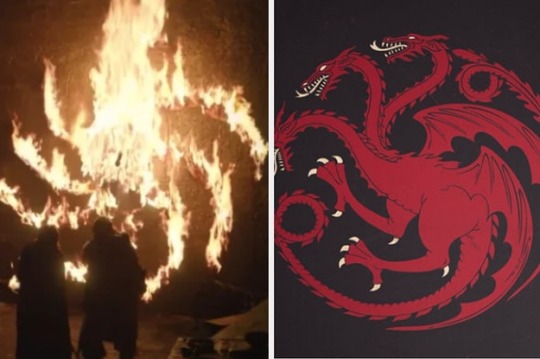
There is indeed a bit of a likeness - and it is worth noting that the Targaryen sigil and the spirals that the WW each have seven arms.
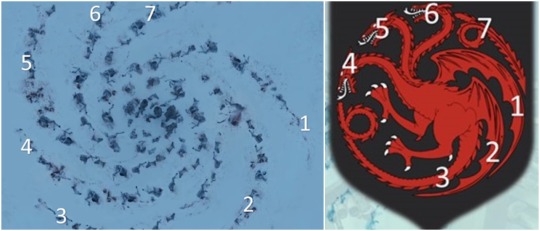
(source)
Is this resemblance merely a coincidence or is there a deeper meaning at work? It is hard to tell but I want to explore this connection a bit further because the sole known Targaryen of this story is, in fact, also visually connected to the spiral symbol. In season 4, Daenerys Targaryen wears a dress made from laser-cut fabric that sports a repeated spiral pattern.

She is also known as the Stormborn because she came into the world during the worst storm that Westeros had seen in living memory. She is also a very war-like character and it is worth remembering that in the books “storm” is often used as a synonym for for “war”. With a bit of squinting one can even perceive s spiral shape hidden in one of the final images of the season 3 finale where Daenerys is lifted up by the freed slaves of Meereen.

It is faint but you could make an argument that it is there. This connection between Daenerys and the Night King is enhanced by the larger thematic framework of GRRM’s story. They are both associated with the extremes of Ice and Fire - indeed, just like the dragons are Fire Made Flesh, so are the White Walkers Ice made Flesh, which I have examined elsewhere.
THE WHEEL
The spiral also somewhat resembles a wheel, as I’ve previously mentioned. I’m not the only person who has noted this resemblance, @lady-griffin mentions this resemblance in this post. In the later seasons, Daenerys Targaryen has become known for wanting to “break the wheel” - but what does that mean?

In season 5 she tells Tyrion Lannister that she’ll have the support of the common people in Westeros and she describes the feudal system as a wheel with spokes made up of the noble Houses. In this context, it seems as though she wants to destroy the feudal system of the country she wants to conquer. However, as she herself mentions, her own House is part of this system and she’s not intending to create a radically new system since she still wants to be Queen. She still wants to occupy the hub of the wheel, i.e. the Iron Throne. She simply wants to remove anyone who can be a threat to her power. What she wants is not a more democratic system but an absolute monarchy with her at the top.
Nebulous and contradictory plans is very typical of Dany’s political rhetoric but I’m rather interested in how she describes this system:
“Lannister, Targaryen, Baratheon, Stark, Tyrell. They’re all just spokes on a wheel. This one’s on top, then that one’s on top. And on and on it spins, crushing those on the ground.”
This conjures a specific concept of Classical (and later Medieval) thought: the Rota Fortuna, or Fortune’s Wheel:
In medieval and ancient philosophy the Wheel of Fortune, or Rota Fortunae, is a symbol of the capricious nature of Fate. The wheel belongs to the goddess Fortuna (Greek equivalent Tyche) who spins it at random, changing the positions of those on the wheel: some suffer great misfortune, others gain windfalls. Fortune appears on all paintings as a woman, sometimes blindfolded, "puppeteering" a wheel. (Wikipedia)

Interestingly, the show invokes Fortune’s Wheel visually in the opening credits. Thus, the Rota Fortuna embodies the political game that dominates the show. Fortune’s Wheel is the very embodiment of the Game of Thrones!
The thing about Fortune’s Wheel is that it never stops spinning. The same goes for the political game - there will always be someone who seeks power, regardless of whether there is a throne or not. The games of power and influence exist wherever human society exist regardless of what kind of government they have - there will always be politics and power plays. The only way to truly stop the spinning of the wheel is to eradicate humankind. There can be no game if there are no players.
This leads me back to the what the spiral may have meant for the Children of the Forest. The NK has adopted this symbol as an act of mockery - it signifies blasphemy on his part according to show writer Dave Hill. In this context, it is important to note that the WW always create this spiral symbol out of dismembered bodies - it is made of dead things and, in a way, the spiral as it is made by the WW symbolizes Death. If the WW’s spiral is an image of Death and it represents an act of blasphemy on the part of the NK, then it is very possible that the spiral signified Life for the CotF - symbolizing that Life spins ever onward through nature.
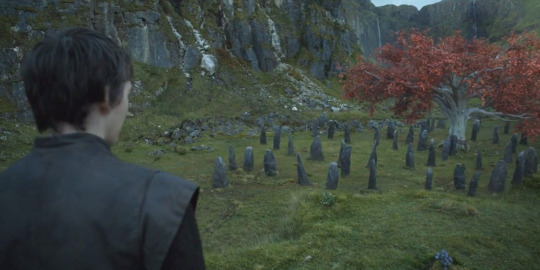
They created the NK by killing and magically re-animating a human man. The original blasphemy was theirs - and there’s a certain symmetry to the fact that the weapon they created by polluting their own magic turned against them. On a final note I also wish to point out that the Weirwood tree where the CotF created the NK is now dead!

This is actually a very important detail because in ASoIaF lore, weirwood trees are practically immortal. They don’t wither and die - unless they are interfered with.
#game of thrones#spiral#symbols#the night king#the children of the forest#the white walkers#daenerys targaryen
179 notes
·
View notes
Text
English Major Galaxy Brain came alive tonight lads! I knew I knew the phrase “vexed to nightmare” from something when it was mentioned in Call Down the Hawk but didn’t look it up and today had a line from “The Second Coming” by Yeats stuck in my head (”the center cannot hold”) and looked it up to read it again cause it’s a good poem and.. that’s where vexed to nightmare is from! Thanks for the roundabout discovery brain
THE SECOND COMING
Turning and turning in the widening gyre
The falcon cannot hear the falconer;
Things fall apart; the centre cannot hold;
Mere anarchy is loosed upon the world,
The blood-dimmed tide is loosed, and everywhere
The ceremony of innocence is drowned;
The best lack all conviction, while the worst
Are full of passionate intensity.
Surely some revelation is at hand;
Surely the Second Coming is at hand.
The Second Coming! Hardly are those words out
When a vast image out of Spiritus Mundi
Troubles my sight: a waste of desert sand;
A shape with lion body and the head of a man,
A gaze blank and pitiless as the sun,
Is moving its slow thighs, while all about it
Wind shadows of the indignant desert birds.
The darkness drops again but now I know
That twenty centuries of stony sleep
Were vexed to nightmare by a rocking cradle,
And what rough beast, its hour come round at last,
Slouches towards Bethlehem to be born?
#anyway wonder if my brain knew this and stumbled back or what#the brain is a weird thing so def possible#Ive read this poem so many times its a wonder I didn't know it in the first place#vexed to nightmare#call down the hawk#yeats#the second coming#diary#mine
12 notes
·
View notes
Text
American Gods Quote 29
Turning and turning in the widening gyre
The falcon cannot hear the falconer;
Things fall apart; the center cannot hold . . .
-
The blood-dimmed tide is loose.
Page 398 paperback
(The Second Coming by William Butler Yeats)
2 notes
·
View notes
Photo


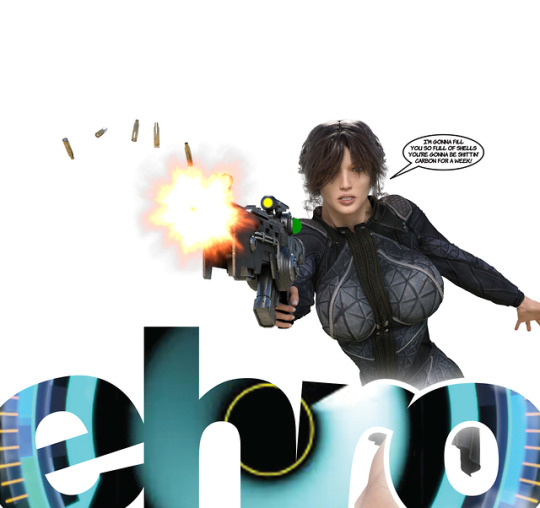
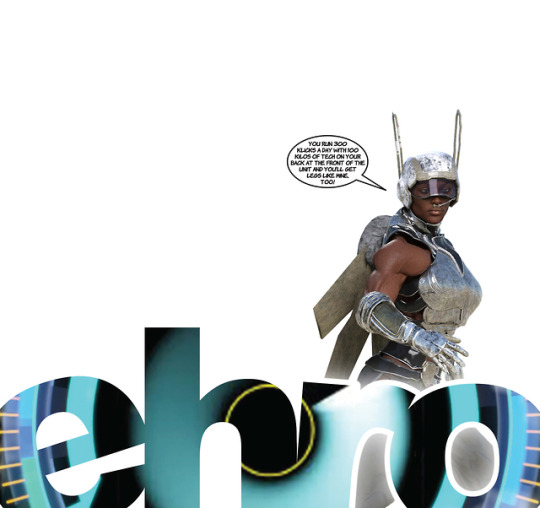
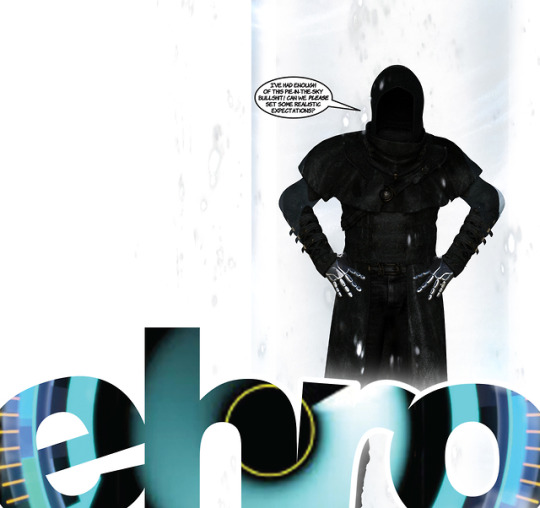
Things fall apart.
When the Planetary Interdict Beacon suddenly goes silent on Thrace 371-D, Directorate Engineer Ehro is dispatched to bring the malfunctioning transmitter back online.
Turning in the widening gyre.
Stranded planetside after a smash-and-grab job goes sideways, privateer Tanith will do anything to get offworld and exact revenge on the people who left her to die.
The center cannot hold.
Hunted by a mysterious AI bent on harvesting the remnants of the planet’s augmented human settlers, Vet returns to her tribe’s encampment after a scouting mission only to find that she is truly alone.
Three human castaways.
A forbidden planet.
Hostile mechs.
An ancient secret buried in the sand.
This is Ehro.
Arriving planetside in 2020.
2 notes
·
View notes
Text
The Smell Of Books
I was starting part 2 of my Olicity fic, Overdue and was suddenly overcome with a brutal dose of writer’s block. I started it, then I stopped, then I started it---but there was nothing there. So, I shifted gears and wrote this little story about having writer’s block.
Spring had come, and Jonas Hiller sat at his computer in search of new ideas.
It had been a long winter, a time in which Jonas struggled with creation, shut up in his little house and ignoring the snow outside, falling from the sky like whispered secrets. All winter he had drifted through the rooms, stoking the fires he built all those months, eating his meals and dreaming his dreams. They left him with no rest. So many hours he spent hunched over the blank screen in front of him, staring at that white page as if looking for clues in an invisible mystery. Frost was in the air and it left him bitterly cold.
Now, sepia colors breathed and blossomed through his window as he sat once again at his station. Behind him, Jonas could feel the eyes of the Master’s upon him, lined up in his bookcase as if they were strict parents expecting the very best from their child. Shakespeare, Keats, Yeats---all rested impatiently in their dusty perches, waiting for Jonas to make them proud. But he could not make them proud.
He turned away from his desk and looked over at the bookcase. He could smell the aroma of leather and dust, familiar smells, like fresh bread baking in the kitchen of his childhood, his mother tied at the waist with her blue apron and giving his mouth reason to water. All through the lengthy winter, Jonas had no thoughts of his own, and reading those books brought him no closer to such musings.
More hours passed and he felt evening come, bringing its shadows to the world. He was exhausted by the absence of words and the tragedy of not being able to tell the simplest of stories. He pushed himself away from his desk and stood up with an unearned stretch. He thought about taking one of those books to bed with him, a nightlight for his mind, but it felt too much like cheating. Jonas gave a silent nod to the bookcase. Those were not his stories, but he wanted them to be. He wanted those tales to tuck him in and lull him to sleep.
He turned, clicked off the light and left his study. He would try again tomorrow.
*
For he is superstitious, grown of late, quiet from the main opinion he held once, of fantasy, of dreams, and ceremonies
-William Shakespeare-
These words spoke in Jonas’s dreams. He awoke the next morning and saw them like crystal monoliths in his head. Again, they were not his words, but they were meant for him.
Outside, birds flew past his window, speaking to him in their own language. He could almost hear their heartbeats, their tales of flying and landing and taking off again. Two rooms over from his bed, Jonas’s study waited for him, a torture chamber of dead ideas and silent thoughts. The exuberance for life those birds sang about gave Jonas a brief flare of inspiration and he heaved himself out of bed, slipped on a bathrobe and went out to once again look for the edges of creation.
An hour later, Jonas sat in front of his computer. And sat. And sat. Waiting. Staring. Thinking. Hoping. There was nothing. The words in his dreams and the songs of birds had vanished. The blank page before him was the same one as yesterday---empty and lifeless. Seconds turned to minutes, minutes to hours. Breakfast became lunch and dinner was just around the corner. Even the smell of books behind him did not bring any direction or advice.
“In Endymion, I leaped headlong into the sea, and thereby have become better acquainted with the soundings, the quicksands, and the rocks, than if I had stayed upon the green shore, and piped a silly pipe, and took tea and comfortable advice.”
Jonas turned around at the sound of the voice behind him. An icy touch of fear stiffened his back. Sitting in an old cracked leather chair next to his bookcase was John Keats. He sat there and stared back at Jonas with soft, knowing eyes.
“I assume you are in search of advice,” he said to Jonas. “Little of it I can give you, but I have been on the edge of that green shore and felt the same fear that consumes you at this moment.”
Jonas sat speechless, wordless and senseless.
“To-morrow, and to-morrow, and to-morrow, creeps in this petty pace from day to day, to the last syllable of recorded time; and all our yesterdays have lighted fools the way to dusty death. It is thy feeling of being alive.”
Jonas heard this quote come out of the invisible air. Keats also looked around. They both recognized the words, and suddenly William Shakespeare materialized in the room, standing behind the leather chair. Keats looked around and up at the great Bard.
“The only means of strengthening one’s intellect is to make up one’s mind about nothing---to let the mind be a thoroughfare for all thoughts,” Keats added.
“Nonsense,” Shakespeare replied. “Intelligence has nothing to do with expression”
Jonas had nothing to add.
Another voice drifted on the air. “Turning and turning in the widening gyre, the falcon cannot hear the falconer; things fall apart; the center cannot hold, the blood-dimmed tide is loosed, and everywhere the ceremony of innocence is drowned; the best lack all conviction, while the worst are full of passionate intensity.”
W.B. Yeats joined the party and Jonas tried to remember his poetry days at college, but they were as transparent as his creative energy. The room was becoming crowded with philosophers. Jonas felt very small in their company.
He finally found his voice and spoke up. “Uh…I’m sorry, but what is going on here? What means of insanity is this?”
The three poets looked at Jonas, filled with their own importance.
“Have we eaten of the insane root that takes the reason prisoner?” Shakespeare quipped.
Jonas shook his head. “Oh…I know what this is. You are my frustrations playing tricks on my mind. I have been trying too hard all this winter to have my say and this is my mind telling me to ease up.” He did not think that hearing voices was crazy; indeed, it was a necessity of writing. But when specters were added to those voices, Jonas suspected that he was not to far away from the land of rubber rooms and butterfly nets. He closed his eyes, hoping that his delusion would disappear while immersed in blackness.
“The sculptured dead, on each side, seem to freeze, imprisoned in black, purgatorial rails,” Keats chanted from his 1820 poem, The Eve of St. Agnes.
Shakespeare and Yeats chuckled at the young poet.
Keats went on, encouraged by their reaction. “And soft adornings from their loves receive upon the honeyed middle of night.”
The other two poets lightly clapped their hands. “Not bad,” Shakespeare said.” Though a bit vague, it has rhythm and verve.”
“But little style,” Yeats harshly added. “Perhaps you find it easier to touch the face of God by speaking to Him with ignorance?”
“What do you mean by that, sir?” Keats angerly replied.
But Yeats only went on keeping his observations to himself.
Jonas opened his eyes and realized he was at the mercy of his delusions.
“A young man” Yeats suddenly spoke. “When old men are done talking will say to an old man, ‘Tell me of that lady, the poet stubborn with is passion sang us when age might well have chilled his blood.”
“Passion? Blood?” Shakespeare seemed to have his head on a swivel, turning it in refusal as he dismissed the persuasion from his peers. “A man whose blood is very snow-broth; one who never feels the wanton stings of motions of the sense.”
Keats cleared his throat. “Sirs, I cannot go on with this useless chanting,” He pointed over at Jonas. “Take heart in the wasted soul and be brave. Words are only small things compared to the majesty of God.” He winked out of existence, once again taking his poetry with him.
Shakespeare and Yeats did not seem to notice departure.
Finally, Yeats decided it was time for him to go as well. “I have enjoyed our voices, William. Once again you push from the sky the very touch of beauty and reason, shining in the secret shimmering of the stars. Adieu.”
Just before he winked out, Yeats turned to Jonas and added one more observation. “Remember---in dreams begins responsibility.”
He was gone.
Shakespeare also felt it time to go. He looked at Jonas and seemed satisfied.
“And so, from hour to hour, we ripe and ripe, and then from hour to hour, we rot and rot. And thereby hangs a tale.”
He winked at Jonas and disappeared, taking his place back up on the dusty shelves of the bookcase.
*
Jonas sat alone in his study, night already painting it acknowledgement of another wasted day at his computer. Yet, there was no weariness or frustration from his lack of words. Perhaps the poets were right. Life and its paces should be enough to give him his own voice. Trying so hard to capture the essence of meaning and reason for it all could be why he does not see the obvious. Jonas turned back around and faced the computer again. He took in another large scent of the smell of books from the bookcase behind him. Leather and dust filled him, and with it, motivation to stand on the edge of what he wanted to say and what will eventually be said without him.
He clicked on the little lamp sitting next to him and began to write about the spring, of its sepia colors and fresh landscapes, once again uncovered by the melting of winter snows.
@memcjo @it-was-a-red-heeler @swordandarrow @hope-for-olicity @vaelisamaza @gabriellamarie97 @almondblossomme @wordslovedreams
14 notes
·
View notes
Link
Turning and turning in the widening gyre The falcon cannot hear the falconer; Things fall apart; the centre cannot hold; Mere anarchy is loosed upon the world, The blood-dimmed tide is loosed, and everywhere The ceremony of innocence is drowned; The best lack all conviction, while the worst Are full of passionate intensity. —William Butler Yeats, “The Second Coming” The center is not holding, things are falling apart. We have moved on from mass psychosis over vaccines to mass psychosis over the urgent need to go to war with Russia. The sanctions are bad enough; the early … Continue reading →
0 notes
Text
The Second Coming - W.B.Yeats
The Second Coming
W.B.Yeats
Turning and turning in the widening gyre
The falcon cannot hear the falconer;
Things fall apart; the center cannot hold;
Mere anarchy is loosed upon the world,
The blood-dimmed tide is loosed, and everywhere
The ceremony of innocence is drowned;
The best lack all conviction, while the worst
Are full of passionate intensity.
Surely some Revelation is at hand;
Surely the Second Coming is at hand.
The Second Coming! Hardly are those words out
When a vast image of the Spiritus Mundi
Troubles my sight: somewhere in sands of the desert
A shape with lion body and the head of a man,
A gaze blank and pitiless as the sun,
is moving its slow thighs, while all about it
Reel shadows of the indignant desert birds.
The darkness drops again; but now I know
That twenty centuries of stony sleep
Were vexed to nightmare by a rocking cradle,
And what rough beast, its hour come round at last,
Slouches towards Bethleham to be born?
1 note
·
View note
Text
The Second Coming
BY WILLIAM BUTLER YEATS
Turning and turning in the widening gyre
The falcon cannot hear the falconer;
Things fall apart; the centre cannot hold;
Mere anarchy is loosed upon the world,
The blood-dimmed tide is loosed, and everywhere
The ceremony of innocence is drowned;
The best lack all conviction, while the worst
Are full of passionate intensity.
Surely some revelation is at hand;
Surely the Second Coming is at hand.
The Second Coming! Hardly are those words out
When a vast image out of Spiritus Mundi
Troubles my sight: somewhere in sands of the desert
A shape with lion body and the head of a man,
A gaze blank and pitiless as the sun,
Is moving its slow thighs, while all about it
Reel shadows of the indignant desert birds.
The darkness drops again; but now I know
That twenty centuries of stony sleep
Were vexed to nightmare by a rocking cradle,
And what rough beast, its hour come round at last,
Slouches towards Bethlehem to be born?
My center cannot hold. I have opened Pandora's box, unleashed my own tawdry desires to my own dismay, none greater than mine. I am exposed again, unfit, incorrect, entirely too much and also lacking greatly.
One pill. One tiny pill, missed for a handful of days, and I am undone. I've shown too much of myself, and made myself ridiculous.
A hundred years past, I'd have sewn rocks in my pockets with Plath. Stuck my head in an oven. Made a careful cut in a warm bath.
I am not made for this world. I feel it too strongly. I'm too aware of the teeming polymer of life covering this planet, of how little difference one life makes.
It's all within reach. Arm's reach, even. Enough pharmaceuticals to bring down a horse.
I feel the circlet of insanity about my skull, and its weight grows with every blink of my eyes.
At what point is a life more trouble than a death?
0 notes
Text
“Turning and turning in the widening gyre
The falcon cannot hear the falconer;
Things fall apart; the center cannot hold…)
—W.B. Yeats
7 notes
·
View notes
Photo








The Centre Cannot Hold It does not take much to realize this world has gone off the tracks. Every other week there seems to be some tragedy which briefly unites us, then causes us to dig into our well fortified bunkers of echo-chambered thought. We could all debate ad nauseum as to the cause, but we can all see the dastardly effects wrought upon our society writ large. Robert Kennedy in a 1967 op-ed quoted a poem by W. B. Yeats: “Turning and turning in the widening gyre The falcon cannot hear the falconer; Things fall apart; the centre cannot hold; Mere anarchy is loosed upon the world, The blood-dimmed tide is loosed, and everywhere The ceremony of innocence is drowned; The best lack all conviction, while the worst Are full of passionate intensity.” Truer words never written/spoken. I don’t know about you, but I’ve heard far too many talking points that no longer give peace to the masses or even galvanize the base. We speak half-heartedly and poorly. We all see the problem, but generally are apathetic until it involves us or those we love. Victims of chaos are tertiary, at best. Cardboard cutouts on a screen in some far-flung locale, at worst. It makes you wonder how long it will be until the center breaks. It also makes you wonder if there is something to the ancient cry of pious believers, who cried “Maranatha.” It also makes you wonder if there is something you can do. At the very least, it should. A call to action, or rallying cry of people to do more than sit and offer vain commentary of “the world gone to hell in a hand basket.” The truth is, we each have a role to play. We can either take up that role graciously and serve one another. Or we can take up that role in Machiavellian consanguinity and mind our own, for the sake of our own. It seems that most of the voices we hear speak to the former, but prefer the power offered by the latter. Maybe then, we should choose not to follow talking heads, but cry along with the saints of old, “Maranatha!”
3 notes
·
View notes
Text
-- W. B. Yeats, "The Second Coming"
"Turning and turning in the widening gyre The falcon cannot hear the falconer; Things fall apart; the center cannot hold; Mere anarchy is loosed upon the world."
1 note
·
View note